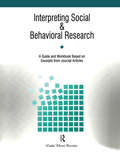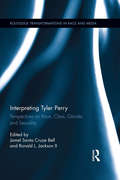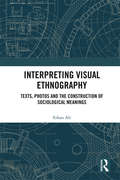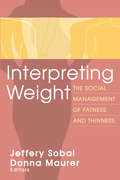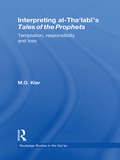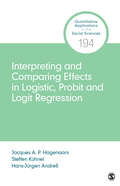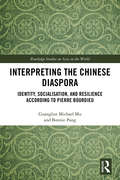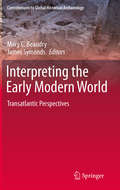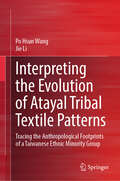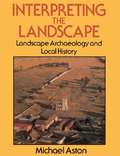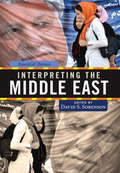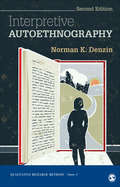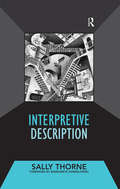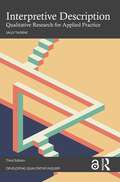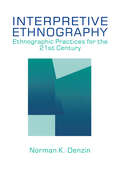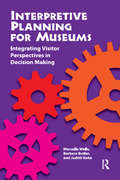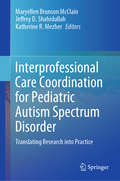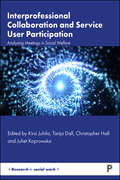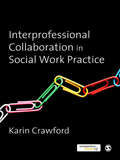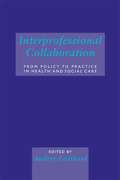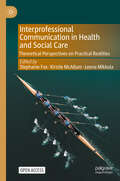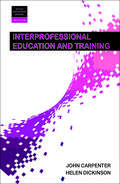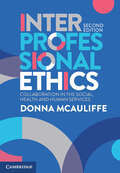- Table View
- List View
Interpreting Social and Behavioral Research: A Guide and Workbook Based on Excerpts from Journals
by Linda E DorstenFirst published in 1996. This book is designed to help students acquire basic skills needed to comprehend social and behavioural science research reports. These skills are needed to understand research results that we confront in our everyday lives in magazines, newspapers, on television, and elsewhere. It includes a guide and a workbook.
Interpreting Tyler Perry: Perspectives on Race, Class, Gender, and Sexuality (Routledge Transformations in Race and Media)
by Ronald L. Jackson Jamel Santa Cruze BellTyler Perry has become a significant figure in media due to his undeniable box office success led by his character Madea and popular TV sitcoms House of Payne and Meet the Browns. Perry built a multimedia empire based largely on his popularity among African American viewers and has become a prominent and dominant cultural storyteller. Along with Perry’s success has come scrutiny by some social critics and Hollywood well-knowns, like Spike Lee, who have started to deconstruct the images in Perry’s films and TV shows suggesting, as Lee did, that Perry has used his power to advance stereotypical depictions of African Americans. The book provides a rich and thorough overview of Tyler Perry’s media works. In so doing, contributors represent and approach their analyses of Perry’s work from a variety of theoretical and methodological angles. The main themes explored in the volume include the representation of (a) Black authenticity and cultural production, (b) class, religion, and spirituality, (c) gender and sexuality, and (d) Black love, romance, and family. Perry’s critical acclaim is also explored.
Interpreting Visual Ethnography: Texts, Photos and the Construction of Sociological Meanings
by Erkan AliFocusing on the use of text in relation to a specific category of image - the photographic image - this book argues for a new appreciation of the relationship between texts and photographs in an age that seems to be dominated by visual images. With reference to a range of traditional and new media forms, and addressing such issues as gender, ethnicity, class, identity politics and biography, the author introduces a new perspective for the use and understanding of the symbiotic relationships that can exist between photographs and texts in the production of sociological, cultural and historical narratives: lamination. Drawing on the work of Barthes and Benjamin, the book explores the material forms of publications that involve the combination of photographs and texts, such as newspapers and journalism, documentary archives, visual ethnographies and on-line social networks, showing how text and image are contexts for one another and so negotiate meaning between themselves. A challenge to the recent 'visual turn' in sociology and cultural studies, which argues - without privileging text or image - for the significance of text in relation to visual images and the production of combined meanings, Interpreting Visual Ethnography will appeal to scholars of sociology, anthropology and media studies with interests in theory, visual methods and text and meaning.
Interpreting Weight: The Social Management of Fatness and Thinness (Social Problems And Social Issues Ser.)
by Jeffery SobalWhat is "too fat"? what is "too thin"? Interpretations of body weight vary widely across and within cultures. Meeting weight expectations is a major concern for many people because failing to do so may incur dire social consequences, such as difficulty in finding a romantic partner or even in locating adequate employment. without these social and cultural pressures, body weight would only be a health issue. while socially constructed standards of body weight may seem immutable, they are continuously recreated through social interactions that perpetuate or transform expectations about fatness and thinness. Written by sociologists, psychologists, and nutritionists, all of the chapters in this book focus on how people construct fatness and thinness, examining different strategies used to interpret body weight, such as negotiating weight identities, reinterpreting weight, and becoming involved in weight-related organizations. Together these chapters emphasize the many ways that people actively define, construct, and enact their fatness and thinness in a variety of settings and situations.
Interpreting al-Tha'labi's Tales of the Prophets: Temptation, Responsibility and Loss (Routledge Studies in the Qur'an)
by Marianna KlarAl-Tha’labi was a renowned Qur’anic scholar of the fifth/eleventh century, and his ‘Ara’is al-majalis is arguably the finest and most widely consulted example of the Islamic qisas al-anbiya’ genre. Drawing on primary Arabic sources, Klar applies modern critical methods in order to explore the nature of al-Tha’labi’s ‘Ara'is al-majalis within its historical and literary context, and thereby produces a compelling examination of the stories of Noah, Job, Saul and David as portrayed in the key historiographical and folkloric texts of the medieval Islamic period. Via a close analysis of the relevant narratives, the book considers a number of universal aspects of the human condition as they are displayed in these tales, from first a religious, then a familial, and finally a social perspective. Touching upon the benefits and limitations of the application of biblical studies and literary motifs to Islamic materials, the book investigates the possibilities of interpretation raised by a primarily psychoanalytical reading of the tales of the four individuals in question. As such, this text will be of great interest to scholars of the biblical prophets, Qur’anic studies, Islamic historiography, folklore and literary criticism.
Interpreting and Comparing Effects in Logistic, Probit, and Logit Regression (Quantitative Applications in the Social Sciences)
by Jacques A. Hagenaars Steffen Kuhnel Hans-Jurgen AndressLog-linear, logit and logistic regression models are the most common ways of analyzing data when (at least) the dependent variable is categorical. This volume shows how to compare coefficient estimates from regression models for categorical dependent variables in three typical research situations: (i) within one equation, (ii) between identical equations estimated in different subgroups, and (iii) between nested equations. Each of these three kinds of comparisons brings along its own particular form of comparison problems. Further, in all three areas, the precise nature of comparison problems in logistic regression depends on how the logistic regression model is looked at and how the effects of the independent variables are computed. This volume presents a practical, unified treatment of these problems, and considers the advantages and disadvantages of each approach, and when to use them, so that applied researchers can make the best choice related to their research problem. The techniques are illustrated with data from simulation experiments and from publicly available surveys. The datasets, along with Stata syntax, are available on a companion website.
Interpreting and Comparing Effects in Logistic, Probit, and Logit Regression (Quantitative Applications in the Social Sciences)
by Jacques A. Hagenaars Steffen Kuhnel Hans-Jurgen AndressLog-linear, logit and logistic regression models are the most common ways of analyzing data when (at least) the dependent variable is categorical. This volume shows how to compare coefficient estimates from regression models for categorical dependent variables in three typical research situations: (i) within one equation, (ii) between identical equations estimated in different subgroups, and (iii) between nested equations. Each of these three kinds of comparisons brings along its own particular form of comparison problems. Further, in all three areas, the precise nature of comparison problems in logistic regression depends on how the logistic regression model is looked at and how the effects of the independent variables are computed. This volume presents a practical, unified treatment of these problems, and considers the advantages and disadvantages of each approach, and when to use them, so that applied researchers can make the best choice related to their research problem. The techniques are illustrated with data from simulation experiments and from publicly available surveys. The datasets, along with Stata syntax, are available on a companion website.
Interpreting the Chinese Diaspora: Identity, Socialisation, and Resilience According to Pierre Bourdieu (Routledge Studies on Asia in the World)
by Guanglun Michael Mu Bonnie PangGlobalisation and migration have created a vibrant yet dysphoric world fraught with different, and sometimes competing, practices and discourses. The emergent properties of the modern world inevitably complicate the being, doing, and thinking of Chinese diasporic populations living in predominantly white, English-speaking societies. This raises questions of what 'Chineseness' is. The gradual transfer of power from the West to the East shuffles the relative cultural weights within these societies. How do the global power shifts and local cultural vibrancies come to shape the social dispositions and positions of the Chinese diaspora, and how does the Chinese diaspora respond to these changes? How does primary pedagogic work through family upbringing and secondary pedagogic work through educational socialisation complicate, obfuscate, and enrich Chineseness? Drawing on Pierre Bourdieu’s reflexive sociology on relative and relational sociocultural positions, Mu and Pang assess how historical, contemporary, and ongoing changes across social spaces of family, school, and community come to shape the intergenerational educational, cultural, and social reproduction of Chinese diasporic populations. The two authors engage in an in-depth analysis of the identity work, educational socialisation, and resilience building of young Chinese Australians and Chinese Canadians in the ever-changing lived world. The authors look particularly at the tensions and dynamics around the participants’ life and educational choices; the meaning making out of their Chinese bodies in relation to gender, race, and language; and the sociological process of resilience that enculturates them into a system of dispositions and positions required to bounce back from structural constraints.
Interpreting the Early Modern World
by Mary C. Beaudry James SymondsThis volume is based on a session at a 2005 Society for Historical Archaeology meeting. The organizers assembled historical archaeologists from the UK and the US, whose work arises out of differing intellectual traditions. The authors exchange ideas about what their colleagues have written, and construct dialogues about theories and practices that inform interpretive archaeology on either side of the Atlantic, ending with commentary by two well-known names in interpretive archaeology.
Interpreting the Evolution of Atayal Tribal Textile Patterns: Tracing the Anthropological Footprints of a Taiwanese Ethnic Minority Group
by Jie Li Po Hsun WangThis book elucidates findings from an anthropological study that analyzes the patterns of Taiwan's Atayal tribe&’s fabric in their ethnic dress codes. By analyzing the changes and development of the patterns over time, the authors draw fascinating conclusions regarding the geographical migration and intermarriage practices between indigenous minority groups in Taiwan&’s history. The book brings new insights within East Asian linguistic anthropology in theorizing about the origins of legends and broader patterns of ethnic migration, integrating the characteristics and relationships among Atayal fabrics, and interpreting these relationships in connection with the flow of sub-ethnic groups. In doing so, the book provides rich empirical evidence for anthropologists and migration scholars to better understand the movement of ethnic groups in Taiwan, while also establishing a model for how studying textile design can be employed to establish such linkages. The book shows that the composition and changes of ethnic minority patterns have their own internal logic and causes. By studying this, the authors demonstrate how such work might translate intangible and tangible culture into explicit and shareable knowledge and provide a compass for other anthropologists and researchers in the fields of visual and linguistic anthropology, migration studies, and ethnic and indigenous cultures, in Asia and beyond.
Interpreting the Landscape: Landscape Archaeology and Local History
by Michael AstonMost places in Britain have had a local history written about them. Up until this century these histories have addressed more parochial issues, such as the life of the manor, rather than explaining the features and changes in the landscape in a factual manner. Much of what is visible today in Britain's landscape is the result of a chain of social and natural processes, and can be interpreted through fieldwork as well as from old maps and documents.Michael Aston uses a wide range of source material to study the complex and dynamic history of the countryside, illustrating his points with aerial photographs, maps, plans and charts. He shows how to understand the surviving remains as well as offering his own explanations for how our landscape has evolved.
Interpreting the Middle East: Essential Themes
by David S. SorensonContemporary approaches to comparative studies of the Middle East increasingly recognize how globalization and regional mass communication have blurred differences across countries. <P><P>Populations travel across national borders and compare narratives about political change, economic futures, and the role of the outside world in shaping their lives. Organized by five principal themes of a regional overview, politics, economic development, social context, and international issues, Interpreting the Middle East provides a vibrant introduction to the Middle East that is compatible with this regionalist perspective. Invited authorities contribute insightful and accessible original discussions of central headline-fresh issues such as the aftermath of the Iraq war, Iran's regional ambitions, developments in the Israeli'Palestinian conflict, and the global politics of Middle East oil, gender, and religion. Section introductions by the editor integrate the contributions, and suggested readings, a glossary, and a biographical list of key persons provide helpful guidance for readers.
Interpretive Autoethnography
by Norman K. Denzin“It is time to chart a new course”, writes Norman K. Denzin in Interpretive Autoethnography, Second Edition. “I want to turn the traditional life story, biographical project into an interpretive autoethnographic project, into a critical, performative practice, a practice that begins with the biography of the writer and moves outward to culture, discourse, history, and ideology.” Drawing on C. Wright Mills, Sartre, and Derrida, Denzin lays out the key assumptions, terms, and parameters of autoethnography, provides a guide to using and studying personal experience, and considers the dilemmas and political implications of textualizing a life. He weaves his narrative through family stories, and concludes with thoughts concerning a performance-centered pedagogy and the directions, concerns, and challenges for autoethnography.
Interpretive Description: Qualitative Research For Applied Practice (Developing Qualitative Inquiry Ser. #2)
by Sally ThorneThis book is designed to guide both new and more seasoned researchers through the steps of conceiving, designing, and implementing coherent research capable of generating new insights in clinical settings. Drawing from a variety of theoretical, methodological, and substantive strands, interpretive description provides a bridge between objective neutrality and abject theorizing, producing results that are academically credible, imaginative, and clinically practical. Replete with examples from a host of research settings in health care and other arenas, the volume will be an ideal text for applied research programs.
Interpretive Description: Qualitative Research for Applied Practice (Developing Qualitative Inquiry)
by Sally ThorneInterpretive Description: Qualitative Research for Applied Practice has established itself as the key resource for novice and intermediate level researchers in applied settings for conducting a qualitative research project with practical outcomes.This book takes the reader through the qualitative research process, from research design through fieldwork, analysis, interpretation, and application of the results; provides numerous examples from a variety of applied fields to show research in action; and uses an accessible style to be the ideal book for teaching qualitative research in clinical and applied disciplines. In this new, third edition, leading qualitative researcher Sally Thorne retains the clear, straightforward guidance for researchers and students in health, social service, mental health, and related fields. This new edition includes additional material on positionality, disciplinary blindspots, design logic, arts-based approaches, diversity, mixed methods, writers' block, and dealing with critique. It has been comprehensively updated with new references and case examples throughout.Interpretive Description is an ideal resource for instructors and advanced students interested in qualitative research across a range of disciplines.
Interpretive Ethnography: Ethnographic Practices for the 21st Century
by Norman K. DenzinAs the world's culture has become both postmodern and multinational, so too must ethnography. In this volume, Norman K Denzin examines the changes and sounds a call to transform ethnographic writing in a manner befitting a new age. The author ponders the prospects, problems, and forms of ethnographic interpretive writing in the twenty-first century. He argues cogently and persuasively that postmodern ethnography is the moral discourse of the contemporary world, and that ethnographers can and should explore new types of experimental texts, performance-based texts, literary journalism and narratives of the self to form a new ethics of inquiry.
Interpretive Planning for Museums: Integrating Visitor Perspectives in Decision Making
by Marcella Wells Barbara H Butler Judith KokeMuseum professionals' increased focus on visitors in recent years has been demonstrated by, among other things, the enhanced practice of evaluation and the development of interpretive plans. Yet too often, these efforts function independent of one another. This book helps museums integrate visitors' perspectives into interpretive planning by recognizing, defining, and recording desired visitor outcomes throughout the process. The integration of visitor studies in the practice of interpretive planning is also based on the belief that the greater our understanding, tracking, and monitoring of learners, the greater the impact museums will make on public understanding of the science and humanities disciplines. An approach that advocates thoughtful and intentional interpretive planning that constantly integrates visitor perspectives is the next step in working with, rather than for, our communities; a step toward truly becoming visitor-centered and impactful as essential learning institutions of the 21st century.
Interpretive Planning for Museums: Integrating Visitor Perspectives in Decision Making
by Marcella Wells Barbara H Butler Judith KokeMuseum professionals' increased focus on visitors in recent years has been demonstrated by, among other things, the enhanced practice of evaluation and the development of interpretive plans. Yet too often, these efforts function independent of one another. This book helps museums integrate visitors' perspectives into interpretive planning by recognizing, defining, and recording desired visitor outcomes throughout the process. The integration of visitor studies in the practice of interpretive planning is also based on the belief that the greater our understanding, tracking, and monitoring of learners, the greater the impact museums will make on public understanding of the science and humanities disciplines. An approach that advocates thoughtful and intentional interpretive planning that constantly integrates visitor perspectives is the next step in working with, rather than for, our communities; a step toward truly becoming visitor-centered and impactful as essential learning institutions of the 21st century.
Interprofessional Care Coordination for Pediatric Autism Spectrum Disorder: Translating Research into Practice
by Jeffrey D. Shahidullah Maryellen Brunson McClain Katherine R. MezherThis book addresses the importance and relevance of interprofessional care coordination for children and youth with autism spectrum disorder (ASD). It covers the role of interprofessional collaborations across various settings for multiple service provision purposes. The volume examines interprofessional collaboration among professionals across such broad issues as screening, evaluation, intervention, and overall care management of ASD. In addition, the book explores more narrowly focused issues, such as providing transition services during early childhood and young adulthood, culturally responsive practice and advocacy issues for individuals with ASD from diverse backgrounds, and providing care for individuals with ASD and co-occurring trauma. Finally, the book concludes with the editors’ recommendations for future directions in interprofessional care for pediatric ASD. Topics featured in this book include:Autism screening tools and interdisciplinary coordination of the processes.Dell Children’s (S)TAAR Model of Early Autism Assessment.The Early Start Denver Model (ESDM).Transition from early schooling for youth with ASD.Postsecondary and vocational opportunities for youth with autism.Transitioning from pediatric to adult medical systems.International perspectives in coordinated care for individuals with ASD.Psychopharmacology of ASD. Interprofessional Care Coordination for Pediatric Autism Spectrum Disorder is an essential resource for researchers, clinicians and professionals, and graduate students in clinical child and school psychology, social work, behavioral therapy and related disciplines, including clinical medicine, clinical nursing, counseling, speech and language pathology, and special education.
Interprofessional Collaboration and Service Users: Analysing Meetings in Social Welfare (Research in Social Work)
by Kirsi Juhila, Tanja Dall, Christopher Hall and Juliet KoprowskaThis book brings together contributions from a range of social welfare settings, including child welfare, unemployment, mental health and substance abuse treatment, to examine how interprofessional collaboration and service user participation are realised or challenged in multi-agency meetings. It provides empirically grounded analyses of specific aspects of multi-agency work and offers a distinctive conceptual framework for understanding and analysing interaction during meetings in various social welfare settings. Based on audio and video recordings, the authors provide clear examples of actual practices of social welfare professionals and demonstrate how the realisation of collaborative and integrated welfare policy is contingent on effective interactional practices between professionals and service users.
Interprofessional Collaboration in Social Work Practice
by Karin CrawfordHow can social workers be more effective in collaborative work? What are the skills, knowledge and values required for collaborative practice? How does collaborative social work practice impact on the experience of service-users and carers? These questions are faced by social workers every day and interprofessional collaborative practice is high on the policy agenda for trainees and practitioners. Written primarily for social work students and practitioners, although having relevance across the wider range of stakeholders, this book explores the issues, benefits and challenges that interprofessional collaborative practice can raise. Chapter-by-chapter the book will encourage the reader to critically examine the political, legal, social and economic context of interprofessional practice. It also explores how social workers can work effectively and collaboratively with other professions while retaining their own values and identity. Key features include: - activities to illustrate the ways in which collaborative working can impact upon the experiences of service users, carers and practitioners; - discussions looking at the different people and organisations with whom social workers might work in practice; - examples of research and knowledge for practice; - a glossary to act as a useful quick reference point for the reader; - a companion website. Engaging and well-written, each chapter also includes case studies, reflective questions and links to further reading and sources of information. Interprofessional Collaboration in Social Work Practice will be essential reading for social work qualifying students and for practitioners.
Interprofessional Collaboration: From Policy to Practice in Health and Social Care
by Audrey LeathardInterprofessional collaboration in the health and social care services has become a commanding force, spear-headed by the Government's modernisation programme to improve partnership. Interprofessional Collaboration highlights the benefits and factors arising from working together for patients, service users and carers through a review of theoretical models illustrated by relevant examples. Discussion of topical problems being faced by practitioners, managers, and policy-makers in the health and social care sector covers:*Policy issues from various interprofessional angles, including the place of management, ethical issues and technology*The application of policy to practice in working together across professions, sectors and communities, giving an overview of teamwork, new primary care policies, interprofessional agendas for family support and mental health, and users' and carers' perspectives on collaboration in practice*Policy and practice in learning together, including theoretical challenges and developments internationally.Relevant for all those that have an interest in matters of health, social care, welfare and caring, Interprofessional Collaboration provides comprehensive coverage on interprofessional education and policy in the UK and abroad.
Interprofessional Communication in Health and Social Care: Theoretical Perspectives on Practical Realities
by Stephanie Fox Leena Mikkola Kirstie McAllumThis is an Open Access book. Interprofessional communication remains both under-theorized and under-researched in healthcare contexts. This book aims to fill that gap by offering practitioners, policy makers, interprofessional curriculum builders, and students in the health professions a broadened theoretical understanding and rich empirical examples of interprofessional communication across a range of health and social care contexts. Importantly, this means opening the black box of what it means for interprofessional collaboration to be “effective,” in particular, for complex, collective practices that rely on shared meanings and accountabilities. Divided into three parts, the book brings together the practical and conceptual expertise of scholars and practitioners from the fields of communication, interprofessional education, health and human sciences, and healthcare management.
Interprofessional Education and Training 2e (Better Partnership Working series)
by John Carpenter Helen DickinsonThe idea that professionals in health and social care should ‘learn together to work together’ in ‘interprofessional education’ (IPE) is not new. Nevertheless, interest in this concept has grown dramatically. By learning together, professions will better understand each other and value what others bring to the practice of collaboration. Through working together more effectively, the quality of care and outcomes for users will be improved, but what is the evidence to support this? How can effective and sustainable IPE programmes be designed and run? What theoretical perspectives are useful? How can programmes be evaluated? This essential guide provides a thorough introduction to IPE in health and social care. It examines the research on IPE in detail, providing much-needed practical advice. This second edition includes updates to research and policy internationally, examples of successful programmes and methods of evaluation, and provides readers with an essential set of IPE ‘do’s and don’ts’.
Interprofessional Ethics: Collaboration in the Social, Health and Human Services
by Donna McAuliffeThe social work, health and human services sectors employ a variety of professionals to provide care to people. There is an increasing need for practitioners to be skilled in ethical decision making as the professional practice context becomes more complex and concerned with risk management. Interprofessional Ethics explores the ethical frameworks, policies and procedures of professional practice for multidisciplinary teams in health, government and community-based workplaces. The second edition includes content on criminology, environmental practice, youth work practice, the intersection of law and ethics, and cultural content, including non-Western philosophies and Indigenous worldviews. New 'Through the eyes of a practitioner' boxes provide insight into the professional experiences of practitioners in the field, while reflection points and links to further readings encourage students to think critically about the content. Interprofessional Ethics encourages readers to better understand the perspectives, approaches and values of others, preparing them to work within collaborative teams.
